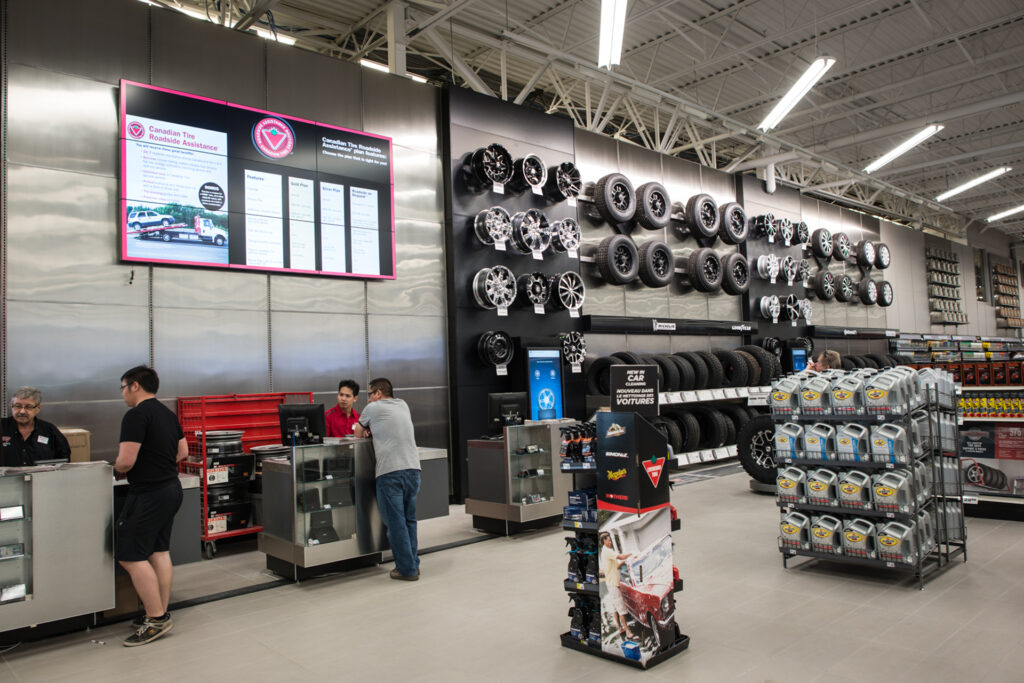Erin Gates does a lot of driving.
Three of her four children play ice sports in the winter and the family skis, so Gates, who lives in Calgary, Alberta, is often driving on highways and to out-of-town tournaments. She drives in snow, through slush, and in icy conditions. Gates bought a used minivan a while back and needed good winter tires for it, but the process of trying to choose the right ones was overwhelming.
She got some welcome guidance from retailer Canadian Tire’s new AI-powered shopping assistant. Called CeeTee, the smiling, waving red triangle helps customers choose tires by asking questions and presenting options based on their responses. Customers can chat with CeeTee by voice or text and ask it to compare tires, check if a tire is in stock at their local store or make personalized recommendations based on specific criteria, such as tires that are bestsellers or on sale.
“I found it really helpful,” Gates says. “It immediately showed me three different kinds of winter tires and different prices and then it told me how many were in stock at my store. I loved that it was so conversational, like I was talking to another person at the store who knew a lot about tires.”
Canadian Tire Corporation (CTC) launched CeeTee, available through Canadian Tire’s app, in March. While 95% of Canadian Tire’s sales happen in its 500-plus stores across Canada, most of those transactions — up to 80% — start with a visit to the retailer’s website. Recognizing that, Canadian Tire created CeeTee to help connect customers with the right tires even before they arrive at a store.
The company’s purpose is to make life for Canadians better, says Ilana Santone, senior vice president of digital and connected retail at CTC, and as part of that, getting customers to the products they’re looking for is considered its top job as a retailer. But the majority of those customers go to the digital property before they go to the store.
“For customers starting online, we stood back and asked ourselves: ‘How can we remove friction in getting them to the right product faster and more easily?’” Santone says. “That’s really how CeeTee came about. We looked at the big friction points across the journey and then looked at ways to either remove friction or support customers in-store and online. Gen AI presents the opportunity to do this differently, or even better.”
Developed in partnership with Microsoft, CeeTee runs on Azure OpenAI Service and uses Open AI’s GPT-4, leveraging a mix of internal product data and knowledge from the large language model to help customers choose tires. CTC did extensive testing to avoid potential errors and implemented controls to mitigate misuse of the tool.
Under the company’s data privacy policy, customers’ information provided or collected during interactions with CeeTee is anonymized and only used to ground the model. Customers are asked for their consent prior to using the tool. Since its launch, the AI assistant has attracted almost 10,000 users and logged over 700,000 chat sessions, according to CTC.

‘True consultative sellers’
CTC, which started with two brothers buying a Toronto tire shop in 1922, expanded over the years into a general merchandise retailer selling everything from auto parts to sports equipment, clothing, home decor and tools. Now, Santone says, CTC has seen the potential for generative AI to help address some of its big challenges — among them, connecting customers with the right products.
Tires, which are core to Canadian Tire’s offerings, was selected as the first category given the complexity in the buying process. The company already has a high share of Canada’s tire market, around 18%, and sees CeeTee as an opportunity to gain additional market share while better serving the 2.2 million active customers who use its app.
“Although we do have a high market share, the remainder of the market share in Canada is significantly dispersed,” says Cari Covent, the company’s head of AI and emerging technology. “To add on this type of assistance to buy tires, we felt like it could be a differentiator that other types of car service organizations or tire companies weren’t doing.”
The retail industry has long used AI in areas such as inventory management and customer service, says Sudip Mazumder, senior vice president and retail lead at Publicis Sapient, a global digital consultancy. Over the past year and a half, he says, retailers have been adopting generative AI to engage customers and boost productivity.
Mazumder points to some large retailers in the cosmetics and fashion industries offering “virtual try-on” capabilities that allow customers to virtually try makeup, clothing and other products before buying. Other companies, like Canadian Tire, are using generative AI for virtual assistants that can make personalized recommendations or provide information to employees to help them better assist customers.
Generative AI’s ability to facilitate a dialogue, Mazumder says, makes for a richer and potentially more satisfying customer experience.
“It means that (retailers) become true consultative sellers with the customer and help them through their entire shopping journey,” he says. “Every retailer, big and small, is going after that kind of use case.”
Mazumder sees CeeTee as a valuable tool for customers embarking on a costly and sometimes complex decision. A driver who occasionally tools around the rainy streets of Vancouver will have different tire needs than, say, a commuter living in Saguenay, Quebec, which gets around 10 feet of snow annually.
“I think this will help customers,” he says. “The process now becomes a lot more streamlined.”
John Motuz, who lives on Vancouver Island in British Columbia, took CeeTee for a spin and liked it. He plans to buy a set of all-weather tires soon and says he will “definitely” use the shopping assistant to inform his decision.
“You punch in the info for your car and what type of tire you’re looking for, and it gives you some really good suggestions,” says Motuz, who, like Gates, participated in a customer survey in exchange for a gift card.
“It was almost like a chat, but it was much faster and more relatable. It’s super easy to use.”
Mazumder sees potential for generative AI to transform many aspects of retail, from customer service to supply chain operations and content creation. But he emphasizes that AI can never replace human interaction.
“Human touch is crucial in retail,” he says. “If you become too overdependent on AI, your customer experience could look really sterile. At some point, you want to bring a human into the process.”

An evolving AI strategy
In June 2023, CTC and Microsoft announced a seven-year partnership aimed at leveraging Azure AI tools to better serve customers and driving innovation in Canada’s retail sector.
The collaboration is part of a broader long-term AI strategy at CTC, explains Covent. Almost a decade ago, the executive says, the company began using AI to automate manual tasks — for example, a bot that allows purchase coordinators and category business analysts to make bulk changes to active purchase orders.
“This bot has saved the company close to one million dollars with a minimal investment to build,” Covent says.
Realizing the need to effectively leverage its data, CTC brought in a team of data scientists and began moving data to the Azure cloud platform. It built AI tools and capabilities including a centralized analytics platform, a system for better understanding customers and a solution that uses store-specific data to determine the best mix of products on shelves.
Additionally, CTC launched data and AI literacy training programs for board members and employees and built a chatbot using Azure OpenAI Service called ChatCTC, now being used by more than 4,300 of CTC’s corporate employees to summarize documents, generate content, write code and assist with administrative tasks. According to Covent, the tool saves users between 30 to 60 minutes a day.
The company is taking a “very measured approach” with CeeTee, Santone says, and will be studying how customers use it over the coming months. The tool could eventually be expanded to other product categories and additional channels, including major smart phone operating systems, but the company wanted to focus on tires first.
“Tires is a highly, highly complex business,” Santone says. “This is really about how we look at the tire journey end to end and remove the friction from buying tires so that we are helping our customers with the best experience on the market.”
“After all, we’re Canadian Tire,” she says. “If we can’t solve the tire journey, who will?”
Top image: Ilana Santone, left, senior vice president of digital and connected retail at Canadian Tire, shares a moment with Cari Covent, the company’s head of AI and emerging technology. Photo by Liam Maloney.


